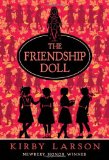
Review posted August 2, 2012.
Delacorte Press, 2011. 201 pages.
The Friendship Doll tells the story of an exquisite Japanese doll, Miss Kanagawa, sent to the United States in 1928 along with fifty-seven other dolls in a gesture of friendship. The book tells about four girls whom Miss Kanagawa encounters over a period of years. All the girls learn a small lesson from the doll, and the doll herself becomes less haughty and learns about love.
I was put off a bit by the very first story. Bunny is pouty because the mean girl Belle Roosevelt gets to give a speech to welcome the doll, even though Bunny could do it better. The doll convinces Bunny not to play a mean trick herself. It just all seemed a little petty, right from the start. Perhaps that was intentional, so we could see some growth in Miss Kanagawa herself.
I did warm up more to the stories of the other girls. Kirby Larson walks a thin line, but stays on the right side of preachiness, even though the girls learn lessons. But it's delicately done. The girls Miss Kanagawa encounters are all quite different from one another, and I found myself enjoying each adventure a little more than the one before.
However, I do have one peeve with the second adventure, during the Depression. This could be a spoiler for this particular story, so be forewarned.
Here's the thing. Lois dreams of flying some day like Amelia Earhart and Bessie Coleman. When she gets to go to the World's Fair with Aunt Eunice, she wants nothing more than to go on a rocket ride zooming two hundred feet above the ground over the lagoon. On the day of the Fair, she has a quarter to spend how she wishes. Then she even gets permission from Aunt Eunice to go on the rockets. But she sees Miss Kanagawa and gets a message from her: A good friend gives our heart wings. She decides instead to buy some exquisite dollhouse furniture for her friend Mabel who couldn't come.
Okay, call me selfish, but I really really wish Lois had gone on the ride! The reason I'm mentioning it is this: Isn't that what girls are so often encouraged to do? Enjoying the moment is selfish -- you should buy something for someone else.
Now, I lived in Europe for ten years. I learned after awhile that buying a souvenir for someone else tends to not mean a whole lot to them. Because a souvenir from a place they haven't been doesn't have any memories tied to it. But even more than that, why can't Lois take the once-in-a-lifetime opportunity being offered her and enjoy it to the hilt, without having to feel guilty that her friend can't share it, too? And what if Mabel doesn't even like what she picks out? But she's supposed to like it because Lois sacrificed her dream to give it. Isn't that a recipe for resentment between them?
Anyway, that's my take on the admittedly artificial situation. But I should add that this would make a fabulous mother-daughter discussion. What do you think?
I wasn't crazy about this book, but I did enjoy it. And I think younger girls, especially ones who still love dolls, will find it enchanting. There are some fascinating historical details as well as lots of fuel for discussion.
